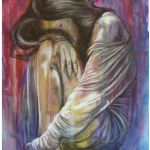By Tsipi Maria & Panagiotou Nefeli-Stavroula (A Class)
We’ve all heard of depression, at least once in our lives. We know that some people suffer from it, but do we really know what it is? Do we understand how these people feel? Probably not. And that’s the exact purpose of the article you’re about to read.
Definition: What Is Depression?
Depression is a serious mood disorder, a state of low mood. Depression affects a person’s feelings, behaviour and even thoughts. Someone that suffers from depression usually shows no interest in lots of activities they used to be keen on, refuses to socialize or in serious cases attempts to commit suicide. Most people think that, depressed is someone who simply feels sad or lonely at particular times but in reality, these people suffer a lot more than we think, as depression can cause insomnia, eating disorders or even aches and pains without any physical causes. So, depressed mood can either be a normal reaction – as long as it doesn’t last for a long time – or a symptom of a psychiatric disorder such as major depressive disorder.
Types of Depression
- Major Depression is characterized by intense feeling of sadness.
- Dysthymic disorder is a less intense type of Depression, but it persists on a longer period of time.
- Adjustment disorders occur when an individual responds negatively to a stressful event.
- Postpartum Depression is Depression that occurs after giving birth.
- Manic Depression or bipolar disorders is a brain disorder that causes unusual shifts in a person’s mood.
- Psychotic Depression includes some features of psychosis, such as hallucinations or delusions.
- Seasonal affective disorder (SAD) is a type of Depression that comes on in the winter months when the sun is sparse.
Signs and Symptoms of Depression
But how can we recognize depression? How can we understand if a person is depressed or not? Well, we usually acknowledge depression from its symptoms. People that experience these symptoms for a long period of time, almost every day for more than two weeks, are likely to have depression:
- Feeling sad, anxious most of the time for no particular reason
- Losing interest for activities they used to be keen on
- Feeling tired, decreased energy
- Thinking about death or committing suicide
- Losing appetite, having some sort of eating disorder
- Becoming a pessimist, having a continuous feeling of guilt and negativity
- Suffering from insomnia, having a sleeping disorder
- Suffering from aches or pains with no physical cause
Depressed people don’t always have these symptoms or show these signs, as each case of depression is different, depending on the person and how serious the case is. These symptoms may appear on the first stage of the illness or even on the final stage.
What YOU can do
If you realize you have some of the symptoms above, the first thing you should do is visit a doctor. They will give you a treatment that can help you. But beyond the treatment, there are some things you can do if you realize that you’re probably suffering from depression or you’re suspicious that some member of your family or loved one is going through a situation like this.
- First of all, you should try to be more optimistic. Set goals and make yourself believe that you can achieve them.
- Don’t be afraid to open up to people. Make friends and keep them close and don’t forget that you’re not alone and there are people who care for you.
- Don’t give up on yourself easily if you feel you can’t achieve something. Situations change gradually and not immediately. So if you can’t achieve a goal, just wait and try again.
- Finally, make sure you’re always aware and knowledgeable. Being ignorant can stop you from preventing a situation like this. If you’re well-informed about such problems then you can help yourself or somebody else to prevent it from getting worse.
If you’re going through something like this, then remember that you shouldn’t be alone. Don’t be afraid to speak about it. That way you can protect yourself or a loved one that could be suffering.
Sources:
- https://www.nimh.nih.gov/health/topics/depression/index.shtml#part_145398
- https://en.wikipedia.org/wiki/Depression_(mood)




